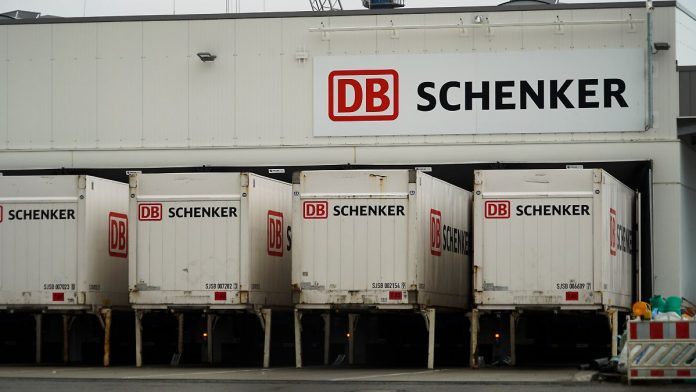Despite acute safety concerns
Ampel favors sale of Schenker to Arab investor
This audio version was artificially generated. More info | Send feedback
Things could now move quickly for Schenker. According to a report, pressure is growing within the government to sell the railway's logistics subsidiary as quickly as possible to a financially strong investor from the Gulf. Schenker supplies NATO and the Bundeswehr. Critics warn of the consequences.
A takeover of Deutsche Bahn's logistics subsidiary by an Arab investor is becoming increasingly likely. This is what the “Handelsblatt” writes, citing government circles. Despite ongoing security concerns – including within the traffic light coalition – preference will be given to the richest bidder. Prospective buyers should be officially introduced in just a few weeks.
The high energy prices have brought billions into the Gulf states' coffers. This suits the government. According to investor circles, a sale of Schenker could bring 10 to 15 billion euros into the cash-strapped coffers. Up to 20 billion have already been mentioned. The aim of the traffic light coalition is to get the maximum price for the state-owned company's logistics subsidiary.
The pressure to sell Schenker quickly is expected to increase. Because of the federal government's budget crisis, the state-owned company has an acute money problem. The traffic light coalition had originally promised Deutsche Bahn 12.5 billion euros. The money was to be used to rehabilitate the dilapidated rail network. The Climate and Transformation Fund (KTF) should be tapped for this purpose. With the Karlsruhe ruling, this source of money has dried up.
It is said that the Chancellery and the FDP-led transport and finance departments in particular are increasingly open to an Arab investor. Schenker is highly lucrative and a sale would make the coffers ring. The other side of the coin: a large part of the railway's sales would be lost if Schenker were sold. And those aren't the only concerns.
The alarm bells are ringing
According to “Handelsblatt”, a total of 20 potential bidders are said to have expressed interest in a takeover in a first round. Logistics companies such as the shipping companies Maersk and MSC or the DHL Group and Kühne + Nagel are in the running. Several financial investors are also mentioned, such as the private equity funds CVC and Carlyle. According to reports, the three richest prospective buyers are the favorites: the Saudi Arabian logistics company Bahri, the Arab investor ADQ – one of three sovereign wealth funds in the Emirate of Abu Dhabi – and the port operator and the world's largest logistics group DP World from Dubai.
There is resistance, especially among the opposition. “Given the importance of logistics companies like Schenker for the resilience of our supply chains, a sale can quickly turn out to be a major security policy mistake,” the “Handelsblatt” quotes transport politician Christoph Ploß. The Logistics industry is one of the few areas in which Germany is still at the forefront worldwide. The traffic light coalition should not now “sell off silverware to foreign investors just because it is not in a position to set budget policy priorities and therefore needs money.”
The Schenker case is complex. The problem: If Schenker goes to the financially strong investors from the Gulf, the government would hand over critical infrastructure to an authoritarian Gulf regime. Schenker supplies facilities armed forces and the NATO. A sale would therefore have implications for the security of the Federal Republic. The United Arab Emirates, which includes Dubai and Abu Dhabi, are repeatedly criticized for money laundering and terrorist financing.
Several fly in the ointment
“All the alarm bells are ringing for us,” warned the head of the Federal Association for the Protection of Critical Infrastructures, Holger Berens, already in December compared to the “Merkur”. They are “strictly opposed to giving control of critical infrastructure to investors from abroad”. Because Schenker supplies NATO and the Bundeswehr, the buyer would know “exactly which weapons and in what quantities are being delivered to where.” Schenker's sale to the Golf is also a “gateway” for economic espionage; the flow of goods at VW, for example, can be viewed as a result.
The government seems willing to take the risk. Only Russian interested parties would fail the bidding process due to the applicable sanctions. The federal government would also probably be more critical of interested parties from China today. European solutions for Schenker are apparently not an option not only for financial reasons, but also because of antitrust concerns.
However, there is still a fly in the ointment: higher sales proceeds will not finally solve the railway's financial problems. As the “Handelsblatt” writes, citing its sources on the supervisory board, around half of the proceeds from the sale will go towards reducing the group’s debt. Otherwise, the railway would lose its credit rating after the sale and further loans would become significantly more expensive. According to the control committee, the bidders will be presented at the railway supervisory board meeting on March 20th. They are said to have not yet been granted access to the books. You reserve that until the end.


